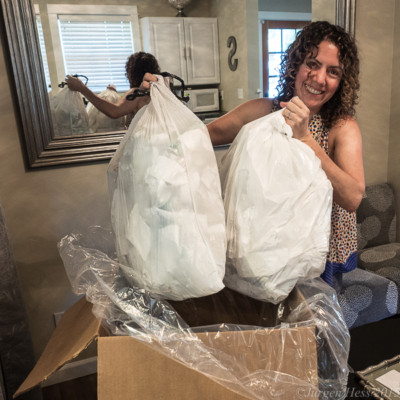Some lucky people’s hair naturally holds sun-kissed highlights. But many, many people get red, gold, or violet—if that calls them—highlights from a beauty salon. It takes skill to weave the colors. A thin section of your hair is combed onto a paper-thin piece of foil, dye brushed on, foil closed, and repeated until your head looks like an ad for an aluminum company.
For years, the used foils could only go in a landfill, because of the chemicals contained in the coloring solutions or because they were plastic-coated. A solution came seven years ago when a Canadian man waiting to get his hair cut noticed how many women were getting their haired colored and wondered what happened to all the used foils. Very little it turned out. He began doing something about it. His company Green Circle Salons found a way to repurpose them.
One of the company’s newest members is Subi Salon in Hood River. Owner Subhadra Katz, Subi, is holding a grand opening in her new Hood River heights location Aug. 12, 2016 from 5 to 7 p.m. In the interest of full disclosure, Subi is the author’s hairdresser. Subi radiates energy for every aspect of hair care and for eco-friendly hair products and recycling.
“I have a thing that nobody knows about and I want help to get the word out: I collect all beauty products for Ann Marie Jelderks. And that can be anything: toothpaste, mascara, deodorant, hair products, any makeup,” Subi says. Ann Marie ships it to Terra Cycle, who recycles them (and almost everything). The money Ann Marie receives she donates to FISH Food Bank.
Green Circle Salons (GCS) takes the used foils and color tubes, the snipped-off hair, and left-over coloring.
Foils and tubes: “They take all the foils?tons and tons and tons,” Subi says. North American hair salons toss away over 109,000 pounds of foils and color tubes every day, writes Will Simpson, Business Development and Education for Green Circle. The metals are sent to a recycler, where they’re smelted to liquid form, turned into ingots and sold to manufacturers. It became practical to develop a way to process them once there was a sufficient quantity.
Hair clippings: “The thing about hair is that it is so absorbent,” Subi says. GCS came up with the idea of stuffing the hair into nylon stockings to make oil spill booms. The company pays women at a minimum security correction facility to make them. The booms work on land and in shallow water spills, but not in deep or fast flowing water. GCS also developed a prototype flat mat made by felting hair. The mats are designed to filter storm water in municipal drains.
Hair color. “When you’re rinsing a color, there’s no way to be 100 percent accurate. There’s always some left,” Subi says. In most salons it’s rinsed down the drain, where it goes into the storm sewer system, but the chemicals aren’t filtered out and go into the rivers, lakes and ocean. GCS sends hair color leftovers to a chemical waste treatment company–the water is removed and the remaining solution neutralized.
“There is no money to be made from the materials: foils, hair, color,” says Will Simpson. Instead the company earns money from an Environmental Stewardship Fee. Salon owners ask clients if they would like to pay $1 for the service. “I haven’t found anyone yet who says no to paying the green fee,” Subi says. “At the end of the month—it’s all on trust basis—they ask me how many clients I had, and I pay that many dollars per head. I’m happy to cover it if the clients don’t want to.”
All the used material go into a large shipping box GCS supplies. When the box is full, Subi calls UPS to pick it up and it’s shipped via UPS carbon neutral shipping.
Besides color agents, salons also use shampoos, conditioners, styling gels and more. Subi’s preference is Davines products. “They’re 100% biodegradable, organic,” she says. “They’re cruelty-free, gluten-free, paraben-free, sulfate-free and vegan. Parabens and sulfates are the two big culprits in the beauty industry.” Davines offsets its environmental impact by using renewable energy in its plants and offices.
Subi’s hope is that all the salons in Hood River join Green Circle and carry eco-friendly products. “There’s no reason for us all to not be doing it. And we could even say Hood River is all beauty sustainable. It would be a great thing to claim for our town.”









